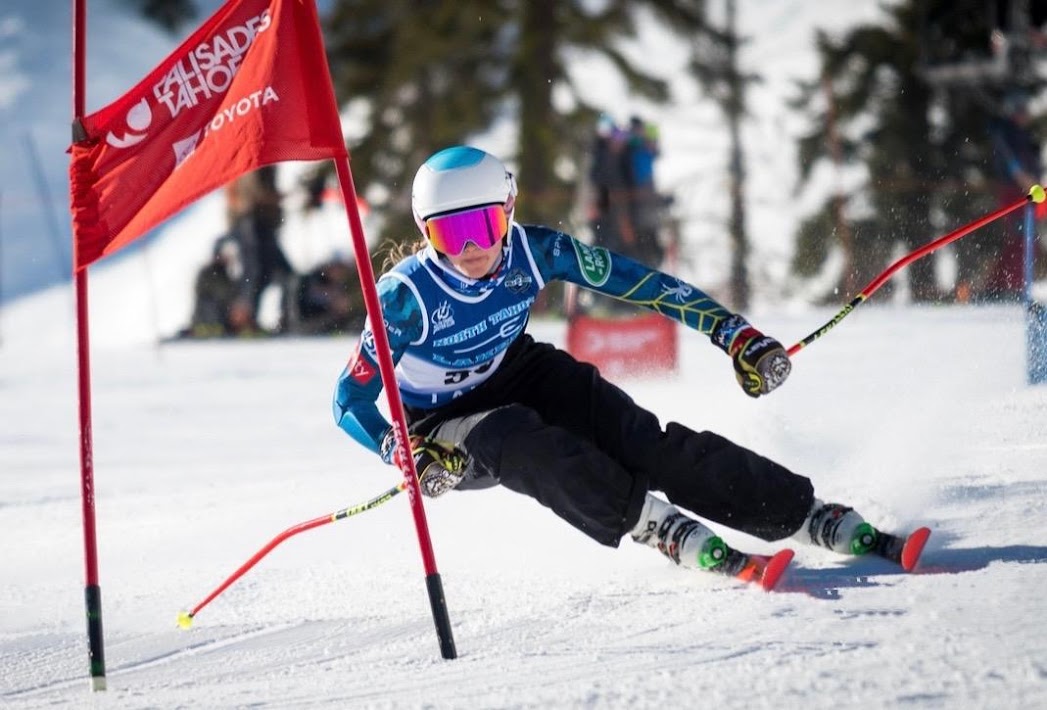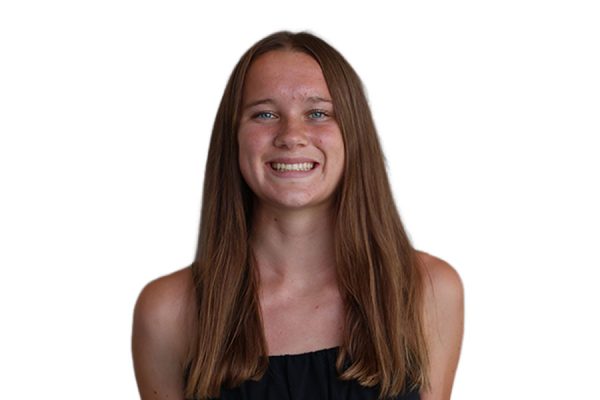There is a higher chance of picking a four-leaf clover, getting into Harvard, or living to 110 years old than making it to the Olympics.
According to Bill Mallon, co-founder of the International Society of Olympic Historians, only about 1 in 500,000 people will qualify for the Games.
But that isn’t stopping Regan Clute, who has been skiing since she could walk and hopes to reach the Olympics one day in alpine ski racing.
“Since I was 9 years old, the Olympics have always been my biggest dream, as well as being named to the U.S. Ski Team and skiing in the World Cup,” Regan Clute said.
According to their website, the U.S. Ski Team operates under the broader organization of U.S. Ski & Snowboard, including teams for different winter sports, like alpine skiing.
They compete in the World Cup, which is a circuit that has more than 90 races from October to March in multiple different countries.
Below the level of the U.S. Ski Team are many other divisions and levels across the United States. Clute is a member of the division below the U.S. Ski Team, FIS, which stands for the International Federation of Skiing.
“Being a FIS athlete, we will be traveling a lot for races during the season, all throughout the west coast, and possibly in Alaska and the east,” Regan Clute said.
PHYSICAL ASPECTS OF TRAINING
“During the summer and early fall, I go to two or three ski camps in Mt. Hood in Oregon, Europe, and South America,” Regan Clute said.
Mt. Hood in particular is famous for operating ten months out of the year and hosting numerous ski camps each summer for aspiring racers.
“The season ramps up in late October or early November, with camps in Colorado before training starts at home. In the winter season, I train 5 days a week for 4 hours a day, ” Regan Clute said.
“Home” is the ski resort Palisades Tahoe in Olympic Valley, California, which has operated since 1949 and hosted the 1960 Winter Olympics. The Palisades ski team program has produced numerous World Cup and Olympic athletes in alpine racing and mogul skiing, including Travis Ganong, Julia Mancuso, and Johnny Moseley.
Palisades has many seasoned coaches that have taught Regan Clute and other athletes. Such as another former Olympian, Marco Sullivan, and also Erik Wilson, who has coached for 15 years while simultaneously teaching high school.
Regan Clute’s coaches put together her training program and set up the training courses for her and her team. Coach Erik Wilson explains his morning routine as a coach.
“We get to the mountain pretty early so we can load early and get up. The first lap for coaches is setting up rope lines to keep the public out, second lap we set the courses,” Wilson said.
Depending on the day, athletes train in the three main disciplines, slalom, giant slalom, super giant slalom, and sometimes downhill. The coaches wait at the top or bottom of the course to watch athletes run the course and give feedback afterward.
“Once we get going, my coaching depends on the athlete. Some want very technical feedback and others I might just ask them a question to get them to think about what they are doing,” Wilson said.
Regan Clute and her team train for races throughout the season, and most training days are similar to the ones that Wilson described. This year, she will travel for races in different parts of the country.
As a FIS racer, this means Regan Clute can ski in that division for as long as she wants, but in order to advance to the U.S. Ski Team, there are criteria she needs to meet in races.
“Some people meet the criteria after their first year of FIS while others take a few years to meet it. Usually, people either go on to college and ski or take a gap year to continue training at Palisades and try to qualify,” Regan Clute said.
In addition to just skiing, she added that gym time is very important during winter and summer. Regan Clute typically spends 3-4 days a week in the gym, while also playing competitive club soccer and mountain biking.
Her dad, Gordon Clute, describes her as very organized with her schedule and equipment.
“She does actually enjoy being on the hill – which is important, as it requires many hours and redundancy. And she takes the dryland gym training very seriously, which is helpful for strength training and injury prevention,” Gordon Clute said.
MENTAL ASPECTS OF TRAINING
Managing stress
Regan Clute also acknowledges the stress that comes with competing at a high level in any sport. With the help of her team’s sports psychologist, she developed some strategies to mitigate stress and improve her overall mindset.
“Some of these strategies include breathing, positive self-talk, grounding myself, and stepping away from the situation to refocus,” Regan Clute said.
She explained that the most difficult aspect of managing her stress and mentality is overcoming mental blocks.
“Like staying positive when I’m not meeting goals and high self-expectations is difficult. It is hard to want to continue sometimes,” Regan Clute said.
Her dad describes her as driven and competitive.
“She thrives more on direct, measurable, head-to-head competition,” Gordon Clute said.
Sullivan, who now coaches at Palisades Tahoe and runs some spring camps, also shared his related advice for stress management from when he was a racer.
“I always just told myself it didn’t really matter what my competitors were doing because all I had to do was my best. That kind of took the stress away because I couldn’t do more than I was going to do, and had to give my best effort. If I didn’t meet my goals, that was a bummer, but it wasn’t really stressful. It was more like, ‘Okay, gotta go train harder,’” Sullivan said.
Regan Clute echoed this sentiment, saying that her primary methods of staying motivated when things get challenging are trying to do self-reflections on training days to focus on the good, not get caught up in the negative.
“She’s very disciplined when it comes to training,” Gordon Clute said.
Wilson, one of her coaches at Palisades Tahoe, agreed that it’s difficult to stay motivated when things get more challenging, making the mental aspect of skiing just as important.
“I like to watch athletes struggle and get frustrated, but then to see the growth. Kids don’t struggle right now, and it’s the only way you’re gonna learn. You learn so much about yourself,” Wilson said.
Setting goals
Regan Clute added that she sets goals for the future as another method of motivation, and from his time racing in the World Cup, Sullivan agreed with how effective he thinks this is.
“I’ve always believed that by setting goals, if you work hard enough, you can probably achieve them. From my own experience, my goal was to win a World Cup race when I was a kid, and I did end up winning one, but then I kind of like fizzled out a little bit after that,” Sullivan said.
He also believes that setting a high bar is the key to success.
“I feel if I had set higher goals, like maybe being the overall champion for 10 years in a row or whatever, if I would have held myself to a higher standard, I could have accomplished more. Overall, it’s important to set your goals high and then really hold yourself accountable to try to achieve them,” Sullivan said.
Balancing skiing and other responsibilities
As a junior at North Tahoe High School in Tahoe City, California, managing school, skiing, and social life is another challenge for Regan Clute.
“I have a special schedule that allows me to leave school half-day and train in the afternoon, but it’s not easy to balance school with all that comes with skiing,” Regan Clute said.
Many hours a week of training, traveling and competing in races, and getting enough sleep are all things she has to juggle in addition to schoolwork. That is why she makes a schedule to help her manage everything, using evenings, weekends, and other days off to stay on top and get ahead of work.
“School always comes first, though, which sometimes means taking the afternoon off to stay at school rather than skiing,” Regan Clute said.
She still makes time for friends and likes skiing with them for fun, enjoying the sport in a non-competitive way.
“My favorite part is that every trail leads somewhere new, and creates opportunities like no other sport can. I love skiing with my friends and making fun memories with them on and off the hill,” Regan Clute said.
Wilson agrees with that and says that friendships are some of the things he likes most about skiing.
“I always say skiing is a lifelong sport, you can share it with your family and your kids, and make friendships for life. It’s huge to take advantage of the friendships you get through ski racing. It’s important to put yourself out there and enjoy it, and it will pay off in so many ways in the long run,” Wilson said.
Even though she spends a lot of time with her teammates and keeps up with her friendships, Regan Clute still sacrifices a lot of her time for skiing and keeping up with schoolwork. This means she often misses out on the standard high school experience. Her dad explained some of the challenges.
“Some of the sacrifices began at 2 years old, in terms of getting up to the mountain and dealing with equipment. We didn’t give kids much of an option, we just went every weekend,” Gordon Clute said.
He added that when she was around 13 years old, they decided as a family to move to Tahoe in order for her to be able to train more and continue competing at a high level.
Still, Regan Clute emphasizes that it’s all worth it.
“I do it for the feeling you get after a really good run and the desire to do it all over again. There’s no way to describe the feeling except pure serotonin,” Regan Clute said.




